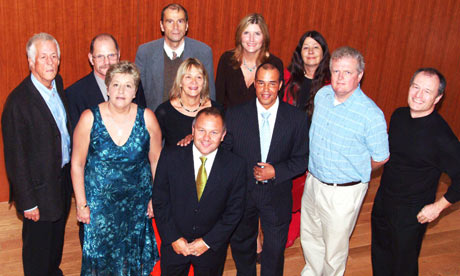
One of the questions Michael Apted is most frequently asked, in relation to his now half-century-old documentary series, 7 Up, is did participating in the programme significantly alter the lives of its subjects?
In 56 Up, the latest installment, bitterness is expressed by some of them: that the snapshot of their lives delivered every seven years is too brief to be meaningful. That they have been fitted into a narrative about the class system in Britain that is unfair and not borne out by the finer details. That they dread the interview every time it comes around.
"There was some residual anger," said Apted when I spoke to him last week. "They were put up for the show as children, before they were able to say no," and were then stuck with it. What's interesting, is that despite their reservations, after the age of 21 most continued to co-operate. Only one – one of the three posh boys – walked away from the show and never came back. (In the latest installment, Peter, missing from the last programme, returns, mainly to publicise his band).
For those coming late to the franchise: in 1964, a group of seven-year-olds was interviewed by Apted about every aspect of their lives, an exercise repeated at seven year intervals. The children embodied the two ends of the social spectrum, Westminster and Oxbridge-bound boys at the top, East End girls at the bottom. "I'm going to work in Woolworths," said seven-year-old Lynn, and by and large, those predictions came true.
What couldn't have been predicted was that a programme devised with the modest intention of giving viewers "a glimpse of England in the year 2000" would grow, over the years, into a candidate for the most affecting piece of television ever made. Births, deaths, marriages, divorces; mental illness; thwarted and realised ambitions; infidelity and its accommodation. That nothing extraordinary happened to the participants only made the series more profound, a dizzying and, at times, existentially terrifying examination of what it is to be alive, unfolding in a kind of emotional time-lapse photography.
After the publicity surrounding the release of 56 Up, lots of people have been binge-watching the entire series, all 12 hours of it, staggering bleary-eyed and stunned into the movie theatre this week for the latest programme. For those who grew up alongside the show, it was a different experience, unsettling for its reminder of who and where we were at the last installment. I remember watching it at school, when the participants were in their 30s, and thinking how dreary and ancient they seemed, and how considerably less ancient and dreary they seem now.
Nick Hornby wrote a column about the series at the time, which I remember well for exactly this kind gloomy backwards projection. How dreadful, he wrote, to be involved in a show where one's youthful idealism is captured and held up against the inevitably more prosaic reality. How appalling his present life would seem – pushing a trolley around the supermarket at weekends; doing ordinary things in the ordinary manner – if juxtaposed with his seven-year-old hope and wonder at the world. (Shortly after writing that, Fever Pitch was published and Hornby became a superstar, which just goes to show).
It's true, the cut-aways from the unblemished seven-year-olds to the ravaged and not so ravaged 56-year-olds is, in places, unbearably poignant, particularly in the case of Neil, the thoughtful, troubled, intermittently homeless man who tells Apted that if he didn't have the video evidence before him, he would never have believed he had been such a cheerful child. But there is something fundamentally hopeful about it, too; with each installment, the reminder that all things pass and that, for the most part, people get on with it with resilience and humour.
Above all, in a television culture so reliant on cheap, phony reality shows, there is the satisfaction of remembering what real people saying real things should look like. (The best drama in 56 Up is when Apted asks each of the married couples if the chemistry between them is still alive, precipitating a moment of exquisite, wounded hesitation from each, as they wait for their other half to respond).
The participants all say that being involved in the programme has not changed the course of their lives, although of course there is no way of knowing. Over the years, says Apted, "a certain amount of pride" has added to their more complicated feelings about the series and many were thrilled when the ratings for 49 Up came in. The latest programme is likely to out-do even that, and deservedly so. "See you here in seven years' time," joked friends outside the cinema on New York City's 6th Avenue this week. And so the clock returns to zero.
56 Up aired on British television last May; it was released in American cinemas this month.

